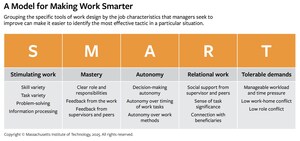CAMBRIDGE, Mass., Aug. 21, 2023 /PRNewswire/ -- Getting pricing right on platform marketplaces for services such as Uber, Fiverr, and Postmates, is critical to successfully attracting both buyers and sellers — and according to new research released today in MIT Sloan Management Review, platform operators aren't always the right parties to make pricing decisions.
A platform's long-term sustainability requires balancing the health of the marketplace with the power dynamics among participants, and often sharing pricing power with service providers and customers, the researchers argue.
"Granting price-setting control is a major strategic decision that ultimately determines value creation and capture and establishes the power dynamics between the platforms themselves, service providers, and customers," explains Jovana Karanovic, an assistant professor at the Rotterdam School of Management, Erasmus University, and coauthor of "Who Should Price a Gig?"
"Creating a scenario where all three stakeholders find the pricing model sustainable and beneficial is the key challenge that platform leaders face. And the solution is usually a hybrid format where some decision and control rights are shared," she says.
Karanovic and coauthors, Elizabeth J. Altman, an associate professor of management at the University of Massachusetts Lowell, and Carmelo Cennamo, a professor of strategy and entrepreneurship at Copenhagen Business School, conducted interviews with platform executives, evaluated pricing models of platform-based businesses in different regions, and analyzed data from a service platform that had changed its model to allow providers to set prices.
Providing a framework for understanding key trade-offs of different platform price-setting approaches, "Who Should Price a Gig?" examines the benefits, risks, and hybrid solutions for all stakeholders.
"Platform leaders must realize that a platform is not a unilateral, hierarchically managed entity but rather a web of economic and social relationships. To manage it successfully and ensure satisfaction by all parties, they must share some aspects of control with other stakeholders, allow for compromise, and step in to support their workforce when needed," said Altman. "When control is shared more equitably by all parties in the platform relationship, the platform model can cater more beneficially to all."
The MIT Sloan Management Review article "Who Should Price a Gig?" publishes at 8 a.m. ET on Aug. 21, 2023.
About the Authors
Jovana Karanovic is an assistant professor at the Rotterdam School of Management, Erasmus University, and founder of the Reshaping Work foundation. Elizabeth J. Altman is an associate professor of management at the Manning School of Business, University of Massachusetts Lowell; guest editor for MIT Sloan Management Review's Future of the Workforce initiative; and coauthor of Workforce Ecosystems: Reaching Strategic Goals With People, Partners, and Technologies (MIT Press, 2023). Carmelo Cennamo is a professor of strategy and entrepreneurship at Copenhagen Business School, director of the Digital Markets Competition Forum, and affiliate professor and director of the Platform Economy & Regulation Monitor at SDA Bocconi School of Management.
About MIT Sloan Management Review
MIT Sloan Management Review is an independent, research-based magazine and digital platform for business leaders, published at the MIT Sloan School of Management. MIT SMR explores how leadership and management are transforming in a disruptive world. We help thoughtful leaders capture the exciting opportunities — and face down the challenges — created as technological, societal, and environmental forces reshape how organizations operate, compete, and create value.
Connect with MIT Sloan Management Review, on:
Tess Woods
Tess@TessWoodsPR.com
617-942-0336
SOURCE MIT Sloan Management Review

WANT YOUR COMPANY'S NEWS FEATURED ON PRNEWSWIRE.COM?
Newsrooms &
Influencers
Digital Media
Outlets
Journalists
Opted In





Share this article